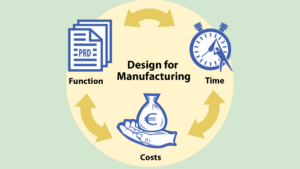Even the most brilliant concept can falter if not accompanied by effective project management. That’s where project management comes into picture. Project management serves as the backbone of any successful engineering project. It’s the roadmap that guides your team from the initial spark of an idea to the final, tangible creation. By implementing a structured approach, you can ensure timely completion, maintain control over resources, and ultimately deliver a high-quality product that meets all project objectives.
Here’s why project management is critical for engineering success:
- Reduced Risks and Streamlined Processes: A well-defined plan helps identify potential roadblocks and mitigate risks proactively. It also establishes clear processes, keeping everyone on the same page and minimizing confusion.
- Efficient Resource Allocation: Effective project management ensures resources like time, budget, and personnel are allocated effectively to meet project goals.
- Improved Communication and Collaboration: Project management fosters clear communication channels between team members, stakeholders, and clients, promoting better collaboration and a unified approach.
- Enhanced Quality and On-Time Delivery: A structured approach helps monitor progress, identify potential issues early, and ensure the project adheres to quality standards while staying on schedule.
But, what are the stages for success?
- Project Initiation: Clearly define the project objectives, scope, and desired outcomes.
- Assemble Your Team: Form a team with the necessary expertise and skills to bring the project to fruition.
- Define Roles and Responsibilities: Clearly assign roles and responsibilities to each team member, ensuring everyone understands their contribution.
A Step-by-Step Guide to Project Management in Engineering
Till now we have understood the importance of project management in ensuring the successful completion of engineering projects. We also emphasized the importance of setting the stage for success by clearly defining project goals, assembling a qualified team, and assigning roles. Now, let’s delve into the step-by-step process of project management in engineering:
1. Project Planning:
- Develop a Work Breakdown Structure (WBS): Break down the project into smaller, more manageable tasks. This creates a clear roadmap and helps estimate resource allocation and timelines.
- Create a Project Schedule: Develop a realistic timeline for each task, considering dependencies and potential delays. Utilize project management tools like Gantt charts or critical path methods to visualize the overall schedule.
- Define Resource Needs: Identify the resources required for each task, including personnel, equipment, materials, and budget allocation.
- Establish Communication Plan: Define communication protocols for team members, stakeholders, and clients. This includes preferred methods (email, meetings, etc.) and communication frequency.
2. Project Execution:
- Task Management: Monitor progress on individual tasks, identify any roadblocks, and implement corrective actions when needed. Utilize project management software for real-time tracking and collaboration.
- Risk Management: Proactively identify potential risks, assess their likelihood and impact, and develop mitigation strategies to minimize disruptions.
- Quality Control: Implement quality control measures throughout the project lifecycle to ensure deliverables meet the required standards.
- Change Management: Be prepared to adapt to changing requirements or unforeseen circumstances. Employ a clear process for handling change requests and communicating updates to all stakeholders.
3. Project Monitoring and Control:
- Regular Progress Reports: Track project progress against the baseline plan and identify any deviations. Prepare regular reports for team members and stakeholders to keep everyone informed.
- Performance Measurement: Utilize key performance indicators (KPIs) to measure project progress and success. Track metrics like budget adherence, schedule milestones, and quality control outcomes.
- Maintain Open Communication: Encourage open communication within the team and with stakeholders. Address concerns promptly and provide timely updates to ensure everyone is on the same page.
4. Project Closure:
- Project Evaluation: Conduct a thorough project review to evaluate successes, identify areas for improvement, and document lessons learned. This information is invaluable for future projects.
- Documentation and Final Deliverables: Finalize all project documentation and ensure all deliverables meet the agreed-upon specifications.
- Team Recognition: Acknowledge and celebrate the team’s achievements. Recognizing their contributions fosters morale and motivates them for future projects.
Conclusion:
By following these steps and best practices, you can effectively manage your engineering projects, navigate challenges, and ultimately deliver exceptional results. Remember, project management is an ongoing process that requires flexibility and adaptability. With a well-defined plan, clear communication, and a dedicated team, you can turn your engineering vision into a reality.
Ready to take your project management skills to the next level?
Here at MARS Manufacturing Solutions, we understand the complexities of engineering projects. We offer a range of project management services, from planning and scheduling to risk management and communication support. Our experienced team can help you navigate every stage of your project, ensuring a smooth journey from concept to creation.
Contact MARS Manufacturing Solutions today and let’s discuss how we can partner with you to achieve your engineering project goals!






